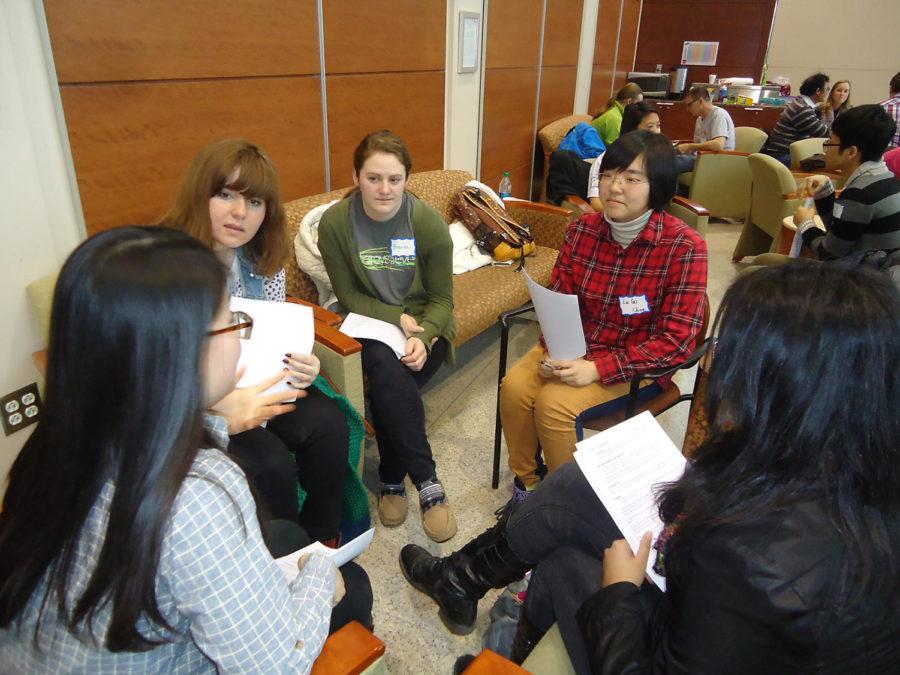Foreign students improve English-speaking skills
International students enjoy English conversation and learn more about American culture and the language with small group discussions over coffee or tea. American ISU students and community members volunteered to make the international transition to Ames easier.
November 7, 2014
English is not the only language to be heard on Iowa State’s campus.
As students explore the community, they can be exposed to multiple other languages that 3,980 enrolled international students bring with them when they come to the United States from their home countries.
Coffee, Tea and English is a group on campus started by G.P. Foote seven years ago. It pairs American students with international students during Friday night meetings held in the commons of the Gerdin Business Building. The American students help facilitate conversations with international students so they can practice their English.
“Americans can help international students as well as make friends with them,” said Autumn Dinkelman, American graduate student in teaching English as a second language.
Coffee, Tea and English is another way for ISU students to choose their adventure. Not only does it expose international students to the English language and American culture, it also exposes American students to the culture and customs of the international students’ home countries.
The idea for Coffee, Tea and English arose as Foote began making connections overseas. He knew of similar groups that met on college campuses in foreign countries, such as China and France.
“English is popular all over the world, and people want to learn English for their work, business and travel,” Foote said.
Foote first began recruiting American students who he knew in the area to help get the group started. Coffee, Tea and English was first held in the Memorial Union but eventually outgrew that location.
From the Memorial Union, Coffee, Tea and English relocated to a lounge in Ross Hall and once they outgrew their space in Ross, relocated again to Carver Hall.
Nancy Foote, G.P’s wife, helps with Coffee, Tea and English. Foote said they weren’t able to serve drinks in Carver which then lead them to move to Gerdin Business Building where they have been located for the past two years.
Dinkelman is a group facilitator for Coffee, Tea and English and wants the international students that attend to make friends and learn about American culture.
“I hope international students that come get what they want out of [Coffee, Tea and English],” Dinkelman said.
Yanlong Song, who goes by Long in the United States, is an international graduate student in kinesiology from China. Song has attended Coffee, Tea and English since last year and said he studied English growing up in China.
“I want to improve my English,” Song said. “After so many years of learning, my English isn’t good enough.”
Upon arrival to Coffee, Tea, and English, international students and American students are able to help themselves to a warm beverage, such as coffee or tea, and a snack provided free of charge. Students are also given a sheet of paper at the beginning of the meeting that has the night’s lesson plans.
The lessons consist of conversation-starting questions, fill-in-the-blank activities, idioms, acronyms and information on American customs and holidays.
“The main objective is to have the students doing the conversation,” Foote said.
Foote uses the same lesson plan layout each week but updates them for each meeting to reflect current events, holidays and activities outside of the group.
Students don’t have to sign up to attend Coffee, Tea and English. American and international students are simply encouraged to come when they are available.
As students begin to attend regularly, they are able to get more practice with their English as well as potentially develop friendships.
Foote said most international students want friends with American students, but it is not always easy to cultivate those unless they live in a residence hall or are involved on campus.
“It’s a safe place for people to come,” Foote said. “It’s opening the door for relationships.”

















